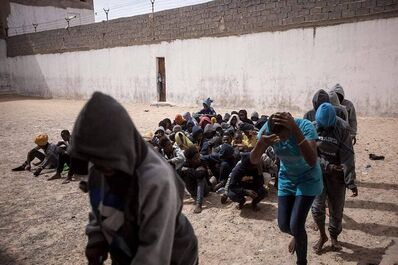 Photo: Narciso Contreras for Fondation Carmignac Photo: Narciso Contreras for Fondation Carmignac There were 10 million “stateless persons” in the world as of 2017. “Stateless persons are not considered as nationals by any State under the operation of its law. In other words, they do not possess the nationality of any State. Many refugees are at risk of becoming stateless.” *Source Be silent for a moment and consider: What would it be like to have no state? To be under no state’s protection? To have no official “nationality”? The Bible makes such a big, and consistent, emphasis on widows, orphans and sojourners because they were in a particularly vulnerable position. They were fatherless, without protection, without the rights and privileges of someone who was part of the nation. If they were abused or taken advantage of, who would know? Who would care? Who would defend? The Bible answers: God knows. God cares. God will defend. And what’s more, God requires his people to know, to care, to defend. The story of Ruth is a literary masterpiece telling the surprising story of a foreign woman without protection. The narrator repeats multiple times that she is a Moabitess, not an official part of the nation of Israel. Deuteronomy 23:3 instructs: “No Ammonite or Moabite or any of their descendants may enter the assembly of the LORD, not even in the tenth generation,” so Ruth is officially unwelcome in Israel. But she also gave up her claim to Moab when she told Naomi: “Where you go I will go, and where you stay I will stay. Your people will be my people and your God my God. Where you die I will die, and there I will be buried.” Woven throughout this story is how dangerous this situation is for Ruth, economically, socially, and physically. Naomi warns her to be careful, and Boaz specifically instructs his fieldworkers to help her and not to abuse her. Near the end of the story she is rejected by a man who should have offered her protection, leaving her once again exposed to danger and ruin. But this is not the end of the story. Boaz is faithful, and he sees the goodness, kindness and nobility of Ruth. He receives her not as a burden but as a blessing. She is faithful to Israel’s covenant, even when the Israelites were not, and through the marriage to Boaz she is brought into the full covenant blessing of the nation. The closing sentences of the story tells us that Ruth, the Moabitess, is part of the line of King David, which also means she is a direct ancestor of Jesus. The Nativity of Jesus is incomplete without the inclusion of Ruth, a “stateless” woman. Read: Ruth Pray: Ask God to help you see stateless people – and all displaced and vulnerable people – not as burdens but as blessings. Pray that your nation would see the same thing.
0 Comments
Your comment will be posted after it is approved.
Leave a Reply. |
WELCOME!
Our vision is to help people survive and recover from forced displacement. We do this together with the church, both globally, and locally in Canada. Archives
May 2024
Categories |
ABOUT IAFR.CA |
OPPORTUNITIES |
AFFILIATES
|
CONTACTIAFR Canada
374 Sheppard Ave E Toronto, ON M2N 3B6 [email protected] Please Note: IAFR Canada does not sponsor people to resettle in Canada. You may want to contact one of Canada's sponsorship agreement holders. |
|
*IAFR Canada is a distinct organization from IAFR USA
All photos on this website are by IAFR unless otherwise noted |
© 2020 International Association For Refugees Canada

 RSS Feed
RSS Feed